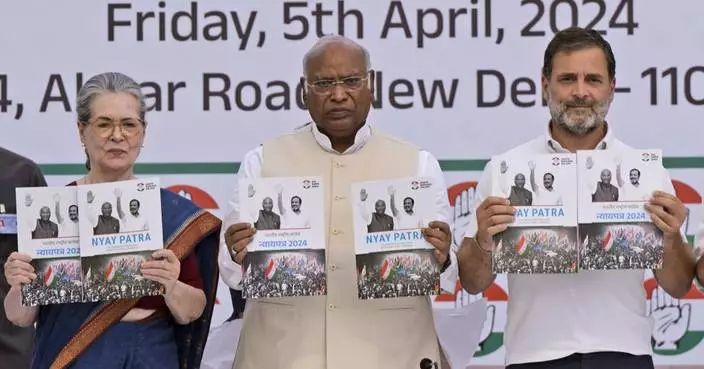Lawmakers in Kosovo approved a contentious and long-pending border demarcation deal with Montenegro Wednesday despite the opposition's use of tear gas to prevent a vote.
The 120-seat parliament voted 80-11 to endorse the deal, ensuring its passage with the minimum two-thirds support required.
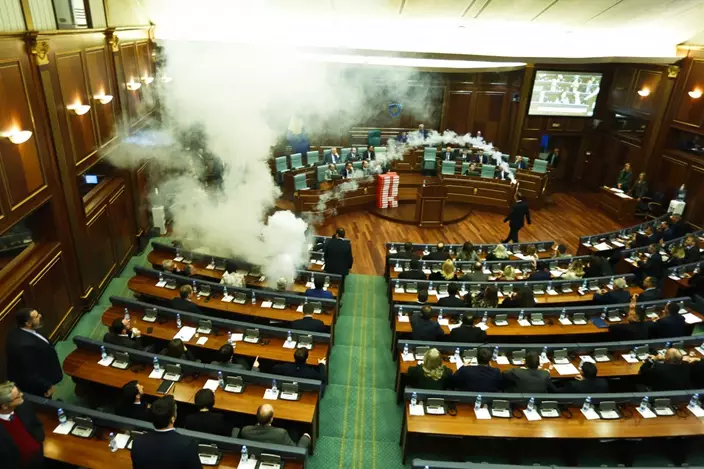
Opposition lawmakers throw a tear gas canister disrupting a parliamentary session in Kosovo capital Pristina on Wednesday, March 21, 2018. Kosovo's Parliament, has temporarily suspended its session after tear gas disrupted the vote on a border demarcation deal with Montenegro. (AP Photo/Visar Kryeziu)
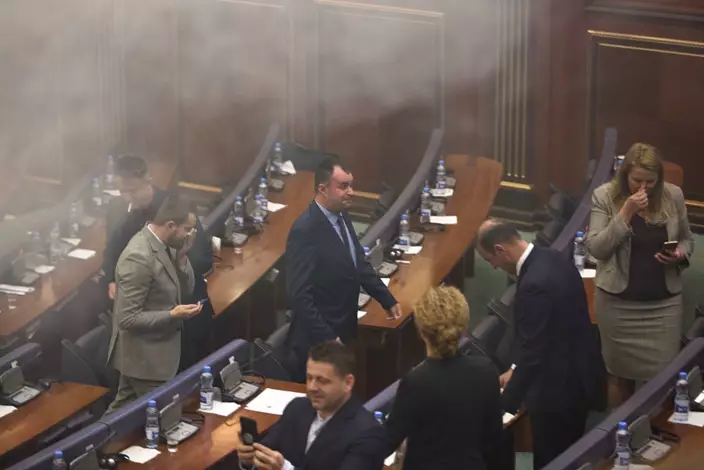
Kosovo lawmakers leave as smoke fills the auditorium of the Kosovo assembly after opposition lawmakers released tear gas canisters disrupting a parliamentary session in Kosovo capital Pristina on Wednesday, March 21, 2018. Kosovo's Parliament, has temporarily suspended its session after tear gas disrupted the vote on a border demarcation deal with Montenegro. (AP Photo/Visar Kryeziu)
The European Union has set the border agreement as a precondition for Kosovo's citizens to travel without visas in Europe's the Schengen travel zone
Kosovo Assembly Speaker Kadri Veseli said he was hopeful the EU would follow through and let Kosovars enjoy visa-free, as citizens of other Balkan region countries already do.
The opposition Self-Determination party says Kosovo loses 8,200 hectares (20,000 acres) of its territory under the agreement, which was reached in August 2015. The previous government and international experts deny that.
Opposition leader Albin Kurti complained that most of the party's lawmakers were barred from the vote or taken away by police for questioning after the tear gas was set off in the Kosovo Assembly.
"Today, 80 lawmakers joined the treason of President (Hashim) Thaci, joined the violation of Kosovo's Constitution and its territorial integrity," Kurti said.
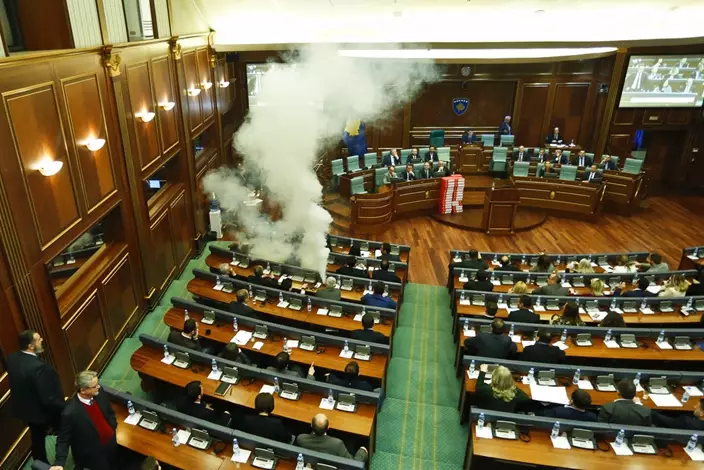
Opposition lawmakers release a tear gas canister disrupting a parliamentary session in Kosovo capital Pristina on Wednesday, March 21, 2018. Kosovo's Parliament, has temporarily suspended its session after tear gas disrupted the vote on a border demarcation deal with Montenegro. (AP Photo/Visar Kryeziu)
At least two lawmakers were injured. Amid the chaos, the session failed four consecutive times to call the vote, but Speaker Kadri Veseli insisted it would take place.
"Today, the trauma of the Montenegro border demarcation will end. The vote will be held today," he said.
Police entered parliament and forced out a small group of opposition lawmakers, who had refused to leave since the morning. Eight of them were barred from taking part in the session and seven were taken to a police station for questioning.
It wasn't clear if they were the same lawmakers who were barred from parliament.
Police also searched every person entering the chamber.
The opposition party, now divided into two groups because of internal frictions, has used tear gas and similar tactics to disrupt parliament over the past three years.
The collapse of votes for the border demarcation agreement and another proposal seeking to give more rights to the ethnic Serb minority toppled the previous government and took the country to an early election last year.
Prime Minister Ramush Haradinaj said there were enough votes to pass the deal. But the two-thirds threshold required defections from the opposition ranks. One opposition lawmaker joined a governing majority party.
President Hashim Thaci, who signed the deal in 2015 when he was foreign minister, will decree the border agreement as the final step.
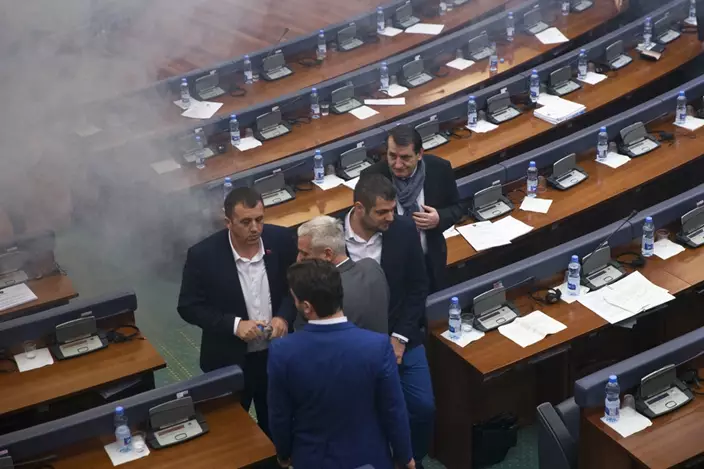
Kosovo lawmakers leave as smoke fills the auditorium of the Kosovo assembly after opposition lawmakers released tear gas canisters disrupting a parliamentary session in Kosovo capital Pristina on Wednesday, March 21, 2018. Kosovo's Parliament, has temporarily suspended its session after tear gas disrupted the vote on a border demarcation deal with Montenegro. (AP Photo/Visar Kryeziu)
Representatives of western powers denounced the use of tear gas and urged the lawmakers to hold the vote in favor of the deal.
"This is really great news. Congratulations Kosovo. Kosovo did the right thing," U.S. Ambassador Greg Delawie said after the vote.
Montenegro, which has approved the deal, recognizes Kosovo's 2008 independence from Serbia, which Belgrade still rejects.
PRISTINA, Kosovo (AP) — Residents of four Serb-majority municipalities on Sunday overwhelmingly boycotted a vote on removing their ethnic Albanian mayors from office following last year’s mayoral elections.
The referendum — supported by the West — was an attempt to diffuse tensions between Kosovo and neighboring Serbia as both countries vie to join the European Union. However, Kosovo's main ethnic Serb party, Srpska Lista, or Serbian List, which has close ties with Belgrade, had called for a boycott of Sunday's poll.
Only 253 out of 46,556 registered voters cast their ballots in all four municipalities. For the mayors to be ousted, a majority vote is needed. No ballots at all were cast in one of the municipalities, Zvecan, according to results after voting ended at 1700 GMT (1 p.m. EDT).
“That is why we note that the citizens’ initiative to oust the mayors of the municipalities of Leposavic, Zubin Potok, Zvecan and North Mitrovica has failed,” said Kreshnik Radoniqi, head of the Central Election Commission, which is in charge of the process.
In June, Kosovo Prime Minister Albin Kurti offered to hold new elections in North Mitrovica, Zvecan, Leposavic and Zubin Potok if 20% of the electorate in the municipalities supported a petition for the polls. Residents voted in favor of the petition in January.
When ethnic Albanian mayors took up the offices last May, Kosovo Serbs clashed with security forces, including NATO-led KFOR peacekeepers, injuring 93 troops, while protesting the results.
Serbia has backed calls for the mayors to step down.
Local and EU observers monitored the process.
The result leaves the same tense status quo in northern Kosovo and its EU-facilitated negotiations to normalize ties with neighboring Serbia. No developments are expected in the months ahead.
Kosovo President Vjosa Osmani accused Belgrade of exerting pressure on Serbs in Kosovo to boycott the referendum.
“Once again Serbia interfered illegally in the election process of another country. Once again (Serbian President Aleksandar) Vucic has not kept his word given to international partners (not to interfere),” Osmani said.
Srpska Lista acknowledged that it wanted “to replace these fake mayors in our municipalities, but we didn’t want to play games directed by the regime in Pristina.” The party accused Kurti's government of exerting pressure on ethnic Serbs in the north with its police presence.
Kosovo was a former Serbian province until a 78-day NATO bombing campaign in 1999 ended a war between Serbian government forces and ethnic Albanian separatists in Kosovo, which left about 13,000 dead, mainly ethnic Albanians, and pushed Serbian forces out. Serbia doesn’t recognize Kosovo’s 2008 independence.
Tensions between the two countries remain high.
On Monday, Kosovo took another major step toward joining the Council of Europe — the continent’s foremost human rights body — amid Serbian opposition. The following day, Belgrade authorities stopped Kosovars trying to go home for nearly 20 hours at border checkpoints, saying it was for security reasons. Pristina accused Belgrade of “holding (Kosovars) hostage” for failing to block Kosovo's Council of Europe membership. The U.S. and EU denounced stalling free movement between the two countries.
Earlier this month, Kosovo announced its first nationwide census since 2011, which will include surveying the ethnic Serb minority in the north. The Srpska List party has denounced the census and called for a boycott, saying it was an attempt by Kurti’s government “to confirm his shameful success in expelling (some 250,000) Serbs,” in reference to the 1999 war.
Another point of contention was Pristina's recent decision to ban ethnic Serbs from using the Serbian currency, the dinar, widely used in Kosovo's Serbian-run institutions, including schools and hospitals.
The United States and the EU are struggling to get the Pristina-Belgrade dialogue “back on track.” Talks between the two have stalled after a Kosovo police officer and three Serb gunmen were killed in a shootout after about 30 masked men opened fire on a police patrol near the Kosovo village of Banjska in September.
Brussels has warned both that refusal to compromise jeopardizes Serbia and Kosovo’s chances of joining the bloc. The 27-nation bloc is keen on maintaining the alignment of the Western Balkan countries — Serbia, Kosovo, Bosnia, Montenegro, North Macedonia and Albania — with the West as Russia’s war against Ukraine continues. The six are at different stages of the accession process.
Llazar Semini reported from Tirana, Albania.
Follow Llazar Semini at https://x.com/lsemini
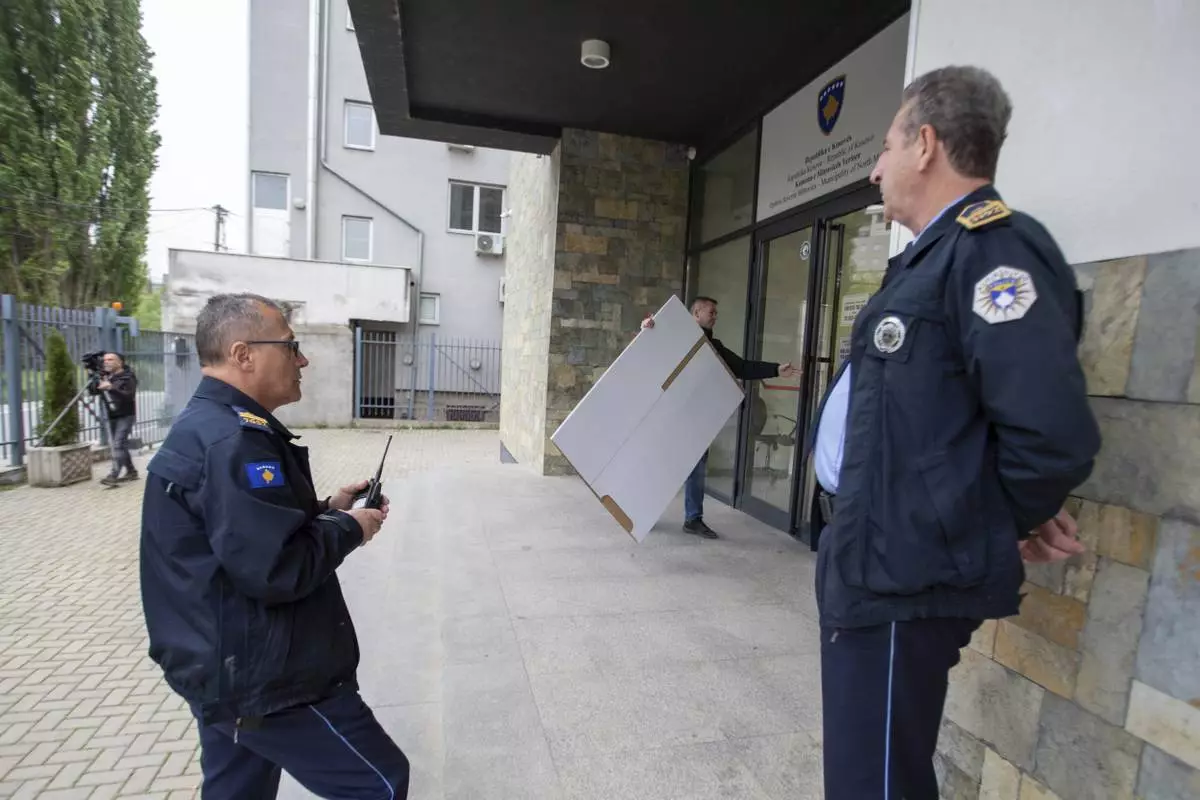
A Kosovo election official carries a voting material at a polling station in the municipality building in North Mitrovica, Kosovo Sunday, April 21, 2024. Residents of four Serb-majority municipalities are casting their votes Sunday in a referendum to decide whether to remove their ethnic Albanian mayors from office following last year’s mayoral elections, overwhelmingly boycotted by the Serb minority. (AP Photo/Visar Kryeziu)
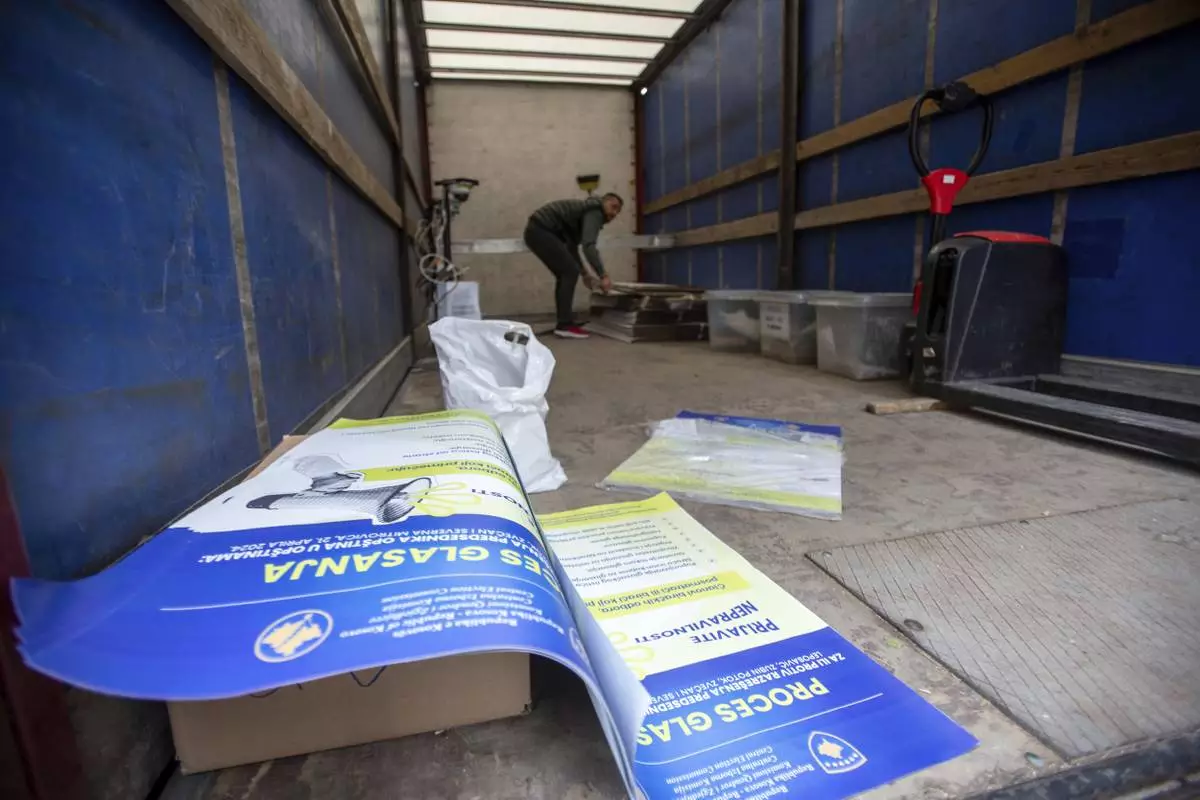
A Kosovo election official unloads a truck with ballot boxes and polling station materials in North Mitrovica, Kosovo Sunday, April 21, 2024. Residents of four Serb-majority municipalities are casting their votes Sunday in a referendum to decide whether to remove their ethnic Albanian mayors from office following last year’s mayoral elections, overwhelmingly boycotted by the Serb minority. (AP Photo/Visar Kryeziu)
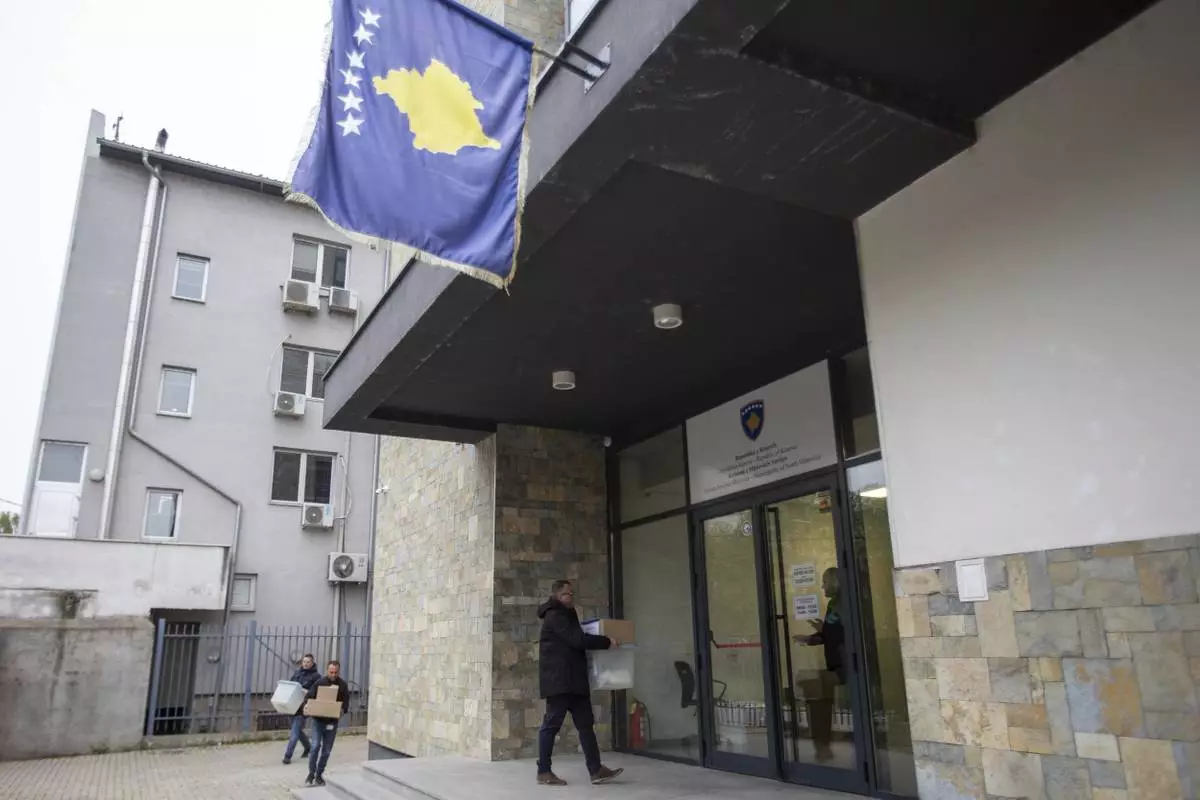
Kosovo election officials carry the ballot boxes and polling station materials in North Mitrovica, Kosovo Sunday, April 21, 2024. Residents of four Serb-majority municipalities are casting their votes Sunday in a referendum to decide whether to remove their ethnic Albanian mayors from office following last year’s mayoral elections, overwhelmingly boycotted by the Serb minority. (AP Photo/Visar Kryeziu)
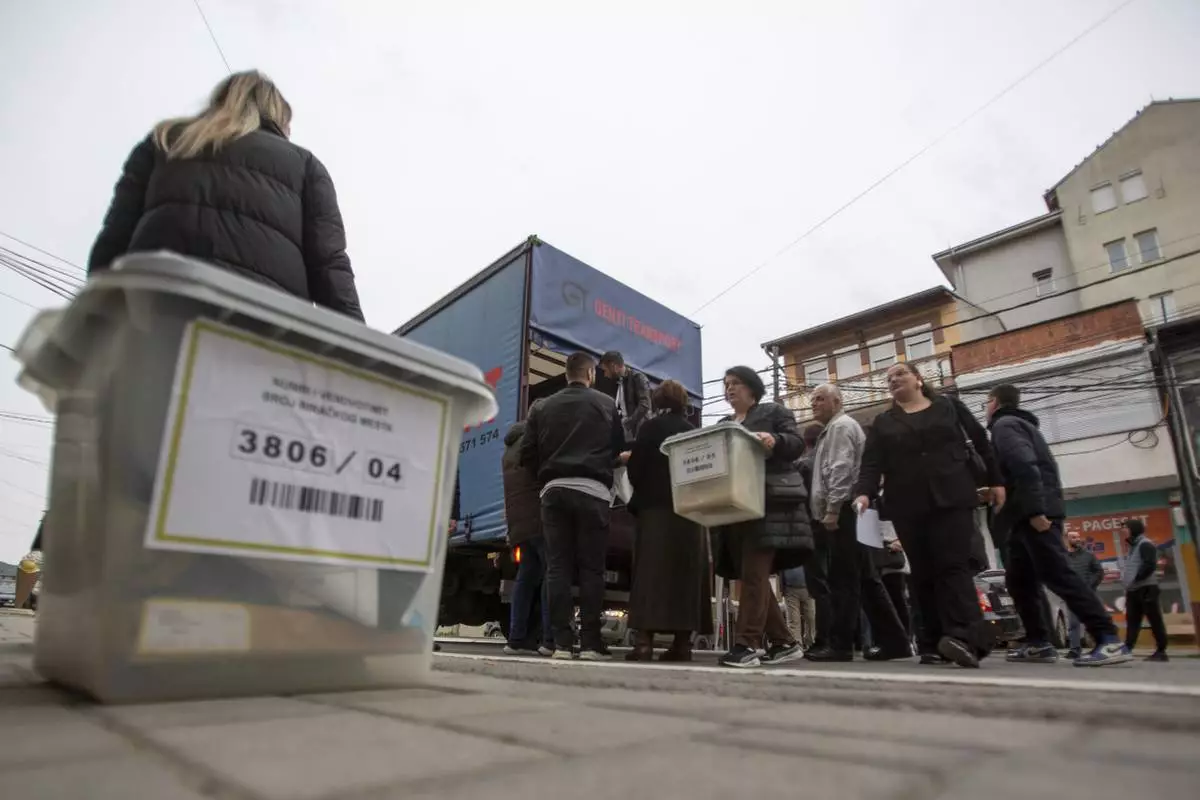
Kosovo election officials unload the ballot boxes and polling station materials in North Mitrovica, Kosovo Sunday, April 21, 2024. Residents of four Serb-majority municipalities are casting their votes Sunday in a referendum to decide whether to remove their ethnic Albanian mayors from office following last year’s mayoral elections, overwhelmingly boycotted by the Serb minority. (AP Photo/Visar Kryeziu)
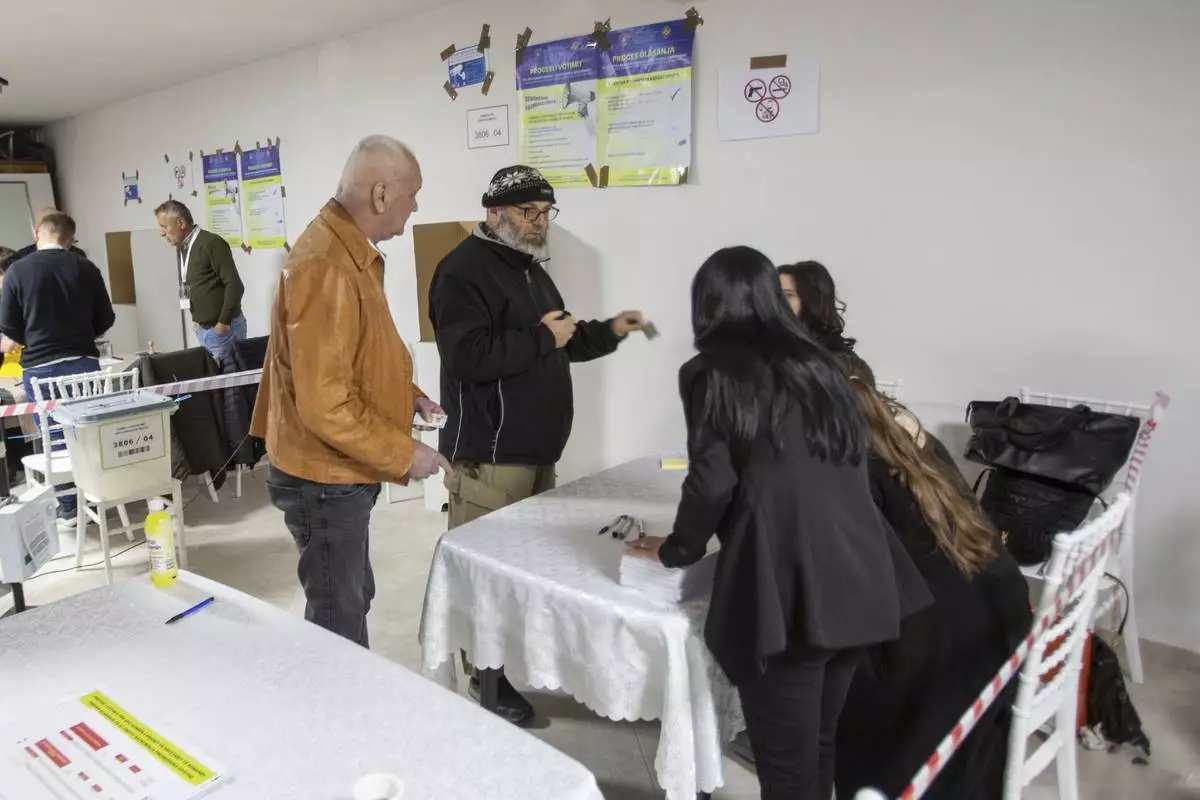
A voter is identified before he casts his vote at a polling station in North Mitrovica, Kosovo Sunday, April 21, 2024. Residents of four Serb-majority municipalities are casting their votes Sunday in a referendum to decide whether to remove their ethnic Albanian mayors from office following last year’s mayoral elections, overwhelmingly boycotted by the Serb minority. (AP Photo/Visar Kryeziu)












